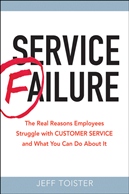How to respond to online complaints
 Jeff Toister
Jeff Toister  Tuesday, August 28, 2012 at 10:00AM |
Tuesday, August 28, 2012 at 10:00AM |  It can feel like a personal attack when customers criticize your company in online forums such as Yelp, Trip Advisor, or even on Twitter. Our first impulse might be to fight back by writing a scathing response that sets the record straight on their so-called “facts” and tells the rest of the world this person is an idiot. While this approach may feel cathartic, it will probably do more harm than good.
It can feel like a personal attack when customers criticize your company in online forums such as Yelp, Trip Advisor, or even on Twitter. Our first impulse might be to fight back by writing a scathing response that sets the record straight on their so-called “facts” and tells the rest of the world this person is an idiot. While this approach may feel cathartic, it will probably do more harm than good.
Here’s a better way to handle online complaints:
First, take a deep breath
Your priority should be preserving your business’s public image. Trading barbs with a customer in an online forum generally has the opposite effect, so it’s best to give yourself a moment to calm down before responding.
Patrick Maguire’s I’m Your Server, Not Your Servant blog recently featured an incendiary restaurant review, an equally incendiary response from the owner, and a follow-up interview with both the reviewer and the restaurant owner. It’s fascinating to gain a better understanding of both parties’ point of view, but it’s also interesting to note that the majority of the commenters felt both were in the wrong. (Read the post here.)
In an example of a worst case scenario, a bookstore owner infamously found herself arrested on battery charges after she confronted a reviewer in person (Read the article in Inc. Magazine). The ensuing press coverage, with article titles like “Angry store owner assaults Yelp reviewer,” was far more damaging to her business than a single reviewer giving the store two stars.
Second, respond strategically
When you respond to an online complaint, you’re not just responding to the complainer; you’re responding to anyone who reads your response. With this in mind, your goal should be to send a message that your business cares about service and you are eager to address any shortcomings.
Here are three tips that consistently work:
- Respond quickly
- Assure the reviewer (and anyone else who is reading) that you want to help.
- Provide a way for the reviewer to contact you privately so you can attempt to resolve their issue.
This approach works whether the complaint is written by a legitimate customer or a jealous competitor who is trying to hurt your business. Either way, it sends a signal to other readers that you are responsive, professional, and care about your customers. You won't win over a vitriolic jerk, but you will win over people who might otherwise have been persuaded to stay away from your business.
Third, look for the hidden truth
Nearly every complaint contains some kernel of truth that you can use to improve service. That’s not to say that you have to agree with everything the person writes about your business, but what if their complaint is really just the tip of the iceberg? Perhaps other people feel the same way, but haven’t voiced their opinion yet. Even worse, they may have just stopped doing business with you. (See more on avoiding icebergs.)
When you think of it that way, someone flaming your business online might actually be doing you a favor. For example, the bookstore owner might have noticed that her critics consistently mentioned that the store was messy and in need of a good cleaning. Even some of the positive reviews agreed that the store could be better organized. Rather than getting defensive, a smart business owner might have taken a day to thoroughly clean and reorganize her store. She could have then responded to all of the Yelp reviewers to thank them for their feedback and invite them to come back for a grand re-opening.
For more information, check out my whitepaper on engaging customers via social media or get a copy of Micah Solomon's outstanding book, High-tech, High-touch Customer Service.




